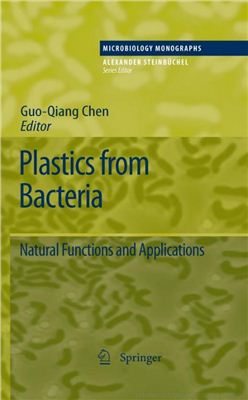Springer-Verlag Berlin Heidelberg, 2010. - 453 с.
The investigation and development of plastics synthesized by bacteria is receiving great attention also due to the raising petroleum prices and many environmental conces related to plastic pollution. Recent results and studies of the properties and various applications of bio-based plastics are presented in this volume. Polyhydroxyalkanoates (PHAs), a biodegradable compound, is treated in several chapters: PHAs as energy and intracellular carbon storage compounds, the metabolic engineering of PHA producers, the development of tailor-made PHAs including uncommon monomers, microbial PHA production from waste raw materials, PHA polyesters produced by both wild-type and recombinant bacteria and the production of medium-chain-length PHAs in pseudomonads. Further microbial plastics discussed are lactic acid and its polymer polylactic acid (PLA), succinic acid and its polymer polybutylene succinate (PBS), ethylene from ethanol and its polymer polyethylene, 1,3-propandiol as well as poly(p-phenylene) (PPP).
Выпуск серии "Монографии по микробиологии" посвящен исследованиям и разработке пластмасс методом синтезирования бактерий. Тема является актуальной с учётом повышения цен на нефть и экологических проблем, связанных с пластиковым загрязнением.
The investigation and development of plastics synthesized by bacteria is receiving great attention also due to the raising petroleum prices and many environmental conces related to plastic pollution. Recent results and studies of the properties and various applications of bio-based plastics are presented in this volume. Polyhydroxyalkanoates (PHAs), a biodegradable compound, is treated in several chapters: PHAs as energy and intracellular carbon storage compounds, the metabolic engineering of PHA producers, the development of tailor-made PHAs including uncommon monomers, microbial PHA production from waste raw materials, PHA polyesters produced by both wild-type and recombinant bacteria and the production of medium-chain-length PHAs in pseudomonads. Further microbial plastics discussed are lactic acid and its polymer polylactic acid (PLA), succinic acid and its polymer polybutylene succinate (PBS), ethylene from ethanol and its polymer polyethylene, 1,3-propandiol as well as poly(p-phenylene) (PPP).
Выпуск серии "Монографии по микробиологии" посвящен исследованиям и разработке пластмасс методом синтезирования бактерий. Тема является актуальной с учётом повышения цен на нефть и экологических проблем, связанных с пластиковым загрязнением.

